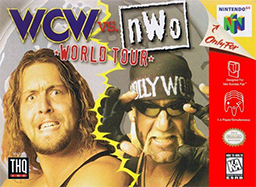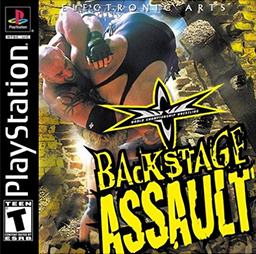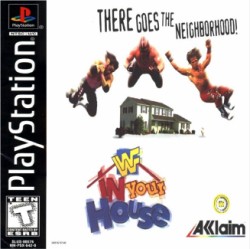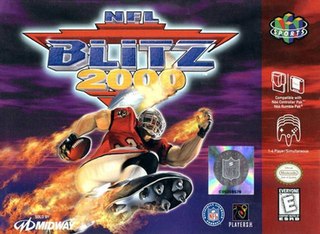
WCW vs. nWo: World Tour is a professional wrestling video game released in 1997 for the Nintendo 64 game console. Released at the peak of World Championship Wrestling's (WCW) dominance in the Monday Night Wars, World Tour was THQ's first foray into the N64 wrestling scene and is a semi-sequel to the lesser known WCW vs. the World for the PlayStation. It is the second best-selling wrestling game for the N64 console.

WCW/nWo Revenge is a professional wrestling video game released in 1998 for the Nintendo 64 game console. It is the sequel to 1997's WCW vs. nWo: World Tour. Like its predecessor, Revenge features AKI's proprietary grappling system; as well as heavily improved graphics, a championship mode, and a large roster of wrestlers.

WWF WrestleMania 2000 is a professional wrestling video game released in 1999 on the Nintendo 64 (N64) console. It was based on the World Wrestling Federation's (WWF) annual pay-per-view, WrestleMania. Despite the fact that this game is based upon WrestleMania 2000, the game was released five months prior to the actual PPV itself, therefore resulting in the game using the stage design from the 1999 event, WrestleMania XV, instead. Released at the height of the WWF's Attitude Era, WrestleMania 2000 was the first WWF game released by THQ. The wrestling company ended its long relationship with Acclaim Entertainment after witnessing the video game success of its competitor, World Championship Wrestling (WCW), on behalf of THQ. WrestleMania 2000 shares its game engine with the Japan-only release Virtual Pro Wrestling 2: Ōdō Keishō.

WWF No Mercy is a professional wrestling video game released in 2000 by THQ for the Nintendo 64. It is based on the World Wrestling Federation and is named after the company's annual event of the same name. Developed by Asmik Ace Entertainment and AKI Corporation, No Mercy is the last in a series of Nintendo 64 wrestling games from the companies that started with WCW vs. nWo: World Tour.

War Gods is a fighting video game originally released to arcades by Midway Games in 1996. Ports for the Nintendo 64, PlayStation and Windows were released in 1997. In the game, players control one of ten fighters who have been given great power by a mysterious ore that crashed-landed on Earth from outer space. The object of the game is to defeat all the other fighters to become the most powerful warrior on the planet.

NBA Live 99 is the fifth installment of the NBA Live video games series. The cover features Antoine Walker of the Boston Celtics. The game was developed by EA Sports and released on November 4, 1998, for the Nintendo 64, and then on November 10, 1998, for the Windows and PlayStation. Don Poier is the play-by-play announcer. It was the first NBA Live game released for Nintendo 64. NBA Live 99 was followed by NBA Live 2000.

Madden NFL 98 is a 1997 football video game. It was the last edition of the Madden series to be released for the Super NES, Genesis and Sega Saturn platforms, as well as the last Madden game to utilize 2D sprites for the players and referee, on 3D playing fields.

WCW/nWo Thunder is a professional wrestling video game based on the professional wrestling television show of the same name and released on the PlayStation console by THQ in January 1999. Thunder is the sequel to WCW Nitro and updates the previous game with new characters and features, including cage matches, battle royals, weapon use, and the ability to select what stable each wrestler competed for. However, Thunder received poor reviews. Many of these were due to its graphics, style, and overall atmosphere, which bore too many similarities to WCW Nitro, along with concerns that the game was too easy.

WCW Mayhem is a professional wrestling video game published by Electronic Arts (EA), based on the American promotion World Championship Wrestling (WCW). The first WCW game produced by EA, it was released for Nintendo 64 and PlayStation in 1999 and for the Game Boy Color the following year.

WCW Backstage Assault is a professional wrestling video game by Electronic Arts (EA). It was the final World Championship Wrestling (WCW) game released before the World Wrestling Federation (WWF) purchased the company's assets three months later. Backstage Assault features commentary by Tony Schiavone and Bobby "The Brain" Heenan. The game is distinguished by the fact that all gameplay takes place outside of a standard wrestling ring. This approach was poorly received, and the game sold only 200,000 copies.

WWF War Zone is a professional wrestling video game developed by Iguana West and released by Acclaim Entertainment in 1998 for the PlayStation, Nintendo 64, and Game Boy. The game features wrestlers from the World Wrestling Federation.

WWF Attitude is a professional wrestling video game based on the World Wrestling Federation released by Acclaim Entertainment in 1999 for the PlayStation and Nintendo 64. A slightly enhanced port of the game was later released for the Dreamcast, as well as a handheld version for the Game Boy Color. The game is named after the WWF's then-current "Attitude" marketing campaign, with the tagline "Get it" also being used on company programming during that period.
Virtual Pro Wrestling is a professional wrestling video game series developed by AKI Corporation and published by Asmik Ace exclusively in Japan. The series started in 1996 with the release of the first Virtual Pro Wrestling for the PlayStation. It was localized in the West as WCW vs. the World. Two other games in the series were released exclusively for the Nintendo 64, Virtual Pro Wrestling 64 and Virtual Pro Wrestling 2.

WWF In Your House is a video game for the PlayStation, Sega Saturn, and DOS. Developed by Sculptured Software, it is a follow-up to WWF WrestleMania: The Arcade Game and was published by Acclaim Entertainment, who had previously released WrestleMania for home consoles.

ECW Hardcore Revolution is a professional wrestling video game released by Acclaim Entertainment, based on the professional wrestling promotion Extreme Championship Wrestling (ECW). The game was released for the Nintendo 64, PlayStation, Game Boy Color, and Dreamcast in 2000. It was the first wrestling game to be based on ECW, as well as the first professional wrestling video game to receive a Mature rating from the ESRB, although the Game Boy Color version was rated Everyone. Acclaim followed this title with the release of a sequel, ECW Anarchy Rulz, in August 2000.

Brunswick Circuit Pro Bowling is a sports video game released for Microsoft Windows and PlayStation in 1998 and the Nintendo 64 in 1999.

NBA Hangtime is a 1996 basketball arcade game developed and released by Midway. Home versions were released for the Nintendo 64, PlayStation, Super NES, Sega Genesis, and Microsoft Windows. A version for Game.com was announced, but cancelled.

WCW vs. the World is a professional wrestling video game for the PlayStation video game console. It was the first game developed by The Man Breeze to be released outside Japan, and is an American localization of their Japanese game Virtual Pro Wrestling, the first game in the Virtual Pro Wrestling series. WCW vs. the World marks the first World Championship Wrestling video game released during its rise amidst the Monday Night Wars.

NFL Blitz 2000 is a video game released in the arcades in 1999 and then ported to the PlayStation, Nintendo 64, Dreamcast, Microsoft Windows, and Game Boy Color. It is the third game in the NFL Blitz series.

Micro Machines V3 is a racing video game developed by Codemasters and Novalicious for PlayStation, Microsoft Windows, Nintendo 64, and Game Boy Color.




















